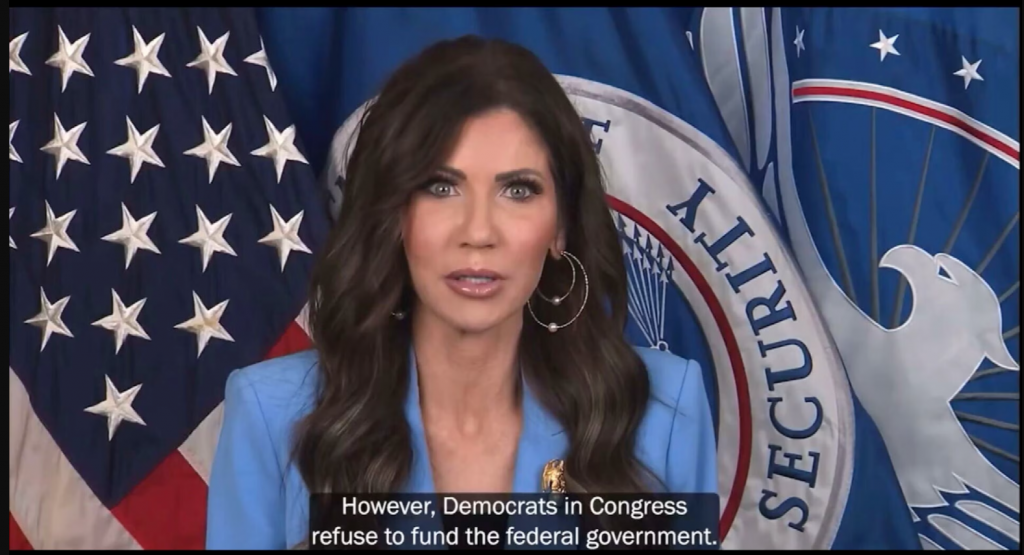As the shutdown continues, the blame game in Washington is growing louder as Republicans and Democrats point fingers at one another for the stalemate. But something more serious is happening in the background — government platforms that are supposed to remain neutral are being used to communicate political messages. For example, here is a screenshot of a video by Homeland Secretary Kristi Noem that is being shown in airports around the country.

And here is an example of the message you might see when you try to access a federal government website.

This isn’t just another round of political rhetoric. It raises questions about potential violations of the Hatch Act, a law meant to keep campaign politics out of government operations.
What the Hatch Act Says
The Hatch Act, enacted in 1939, is designed to ensure that government employees serve the public — not a political party. It places clear restrictions on political activity for federal employees while they’re on duty or using government resources.
In plain language, if you work for the federal government, you can’t:
- Use your position to influence an election.
- Engage in partisan political activity during work hours.
- Use taxpayer-funded resources (such as websites, email, or office space) to support or attack a political party or candidate.
The U.S. Office of Special Counsel (OSC), an independent agency, is responsible for investigating and enforcing these rules.
Why It Matters
The goal of the Hatch Act isn’t to silence political opinions — it’s to protect the integrity of public institutions. Government resources belong to everyone, regardless of political affiliation. Using them to campaign or target a political opponent undermines public trust and the principle of a neutral civil service.
Violations of the Hatch Act are not Uncommon
Violations of the Hatch Act are not unique to one party or administration. Over the years, both Republican and Democratic administrations have been cited:
- Kellyanne Conway (2019) (R): The OSC found repeated violations for using her official position to engage in partisan attacks during televised interviews. The White House at the time declined to discipline her.
- Julián Castro (2016) (D): The then-HUD Secretary was found in violation for commenting on the presidential election during an official interview. He publicly acknowledged the violation and accepted responsibility.
- Kathleen Sebelius (2012) (D): The HHS Secretary was cited for making partisan remarks during an official event; the agency reimbursed the government for the trip to address the violation.
- Bush Administration (2007) (R): OSC investigations found that political briefings and activities were improperly conducted at federal agencies in support of Republican candidates.
These cases show that Hatch Act issues arise in many administrations. Some result in formal reprimands, while others lead to investigations, oversight hearings, or public accountability measures.
What Happens When the Hatch Act Is Violated
Penalties vary depending on the severity of the violation. The OSC can recommend:
- A written reprimand or suspension
- Loss of pay
- Demotion or debarment from federal service (up to five years)
- Removal from government service
While OSC can investigate and recommend penalties, actual disciplinary action often depends on agency heads or the President. This has sometimes led to uneven enforcement.
Enforcement Challenges During a Shutdown
In normal circumstances, OSC investigates Hatch Act complaints promptly. But during a government shutdown, many of its staff are furloughed, delaying any action. This means potential violations may go unaddressed for longer, weakening the deterrent effect of the law. Also, in the current environment, tacit approval for actions that violate the Act may be coming from the highest levels of the administration.
Why Upholding the Hatch Act Matters
Regardless of political affiliation, the Hatch Act helps protect the basic democratic principle that government should serve the public interest — not a political campaign. When political messaging seeps into official channels, it blurs that line.
This is why watchdog groups, courts, Congress, and voters all have a role to play in insisting on accountability. History shows that violations can and do occur across administrations, but how those violations are addressed can strengthen — or weaken — public trust in government.
